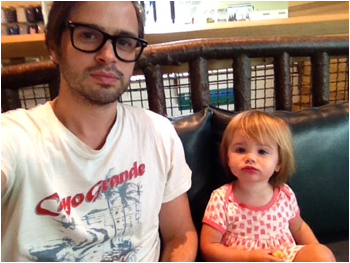
I watched her little leaning body, puffed up in a pink winter coat, tip over and out of the shopping cart, her head striking the concrete first. The rest of her settled on the floor of Home Depot. She was 20 months old. My daughter, Harper.
For a moment, I just stood over her, staring, waiting, frozen in panic. She was only lying there. Not crying. Not doing anything. I scooped her up and ran out of the store. In the car, I called my sister, a nurse. She asked questions and I answered them. Yes, she’s awake. Yes, she’s responding to me. No, I didn’t strap her into the shopping cart with the seatbelt. I forgot.
What the hell was wrong with me? Whose bright idea was it to let me be a parent? Why was my wife leaving our baby in my sole custody five days a week while she was at work? It would have made more sense for us to switch places. She actually wanted to be home, while I would have preferred to be anywhere else: out touring with my band, acting on a TV show, sitting in a coffee shop generating ideas for a novel. But instead, I was at Home Depot shopping for mouse traps and shower caulk with my kid.
I wasn’t ready to be a father. I wasn’t ready to be a husband, either. Or a homeowner. My wife has always been the one in our relationship actively and confidently pushing us to the next step on our shared journey while I sit back and let it happen. The same way I let my daughter fall.
In the end, Harper was completely okay. I wish I’d known then what I know now, that kids are extremely durable — and always thisclose to being permanently ripped from your life. I’ve spoken to dozens of other parents who have shared similar nightmarish stories about their children, tales of fear and anguish and shame that all somehow end happily. But at the time, I lacked the comfort of wisdom and perspective. I was shaken. Shaken in addition to what I already felt — disengaged, frustrated, resentful, bored — all because I’d been forced into a domestic role I stunk at.
I was a pathetic case, far from the type of father a child deserves. I knew something had to change. Perhaps that’s why I ended up doing what I did. One day, during one of Harper’s naps, I started writing a story in the voice of a little girl. I’d never attempted this sort of thing before, stepping into the perspective of someone like Harper. This girl was the opposite of me, a ball of sunshine: energetic, optimistic, unstoppable. I hadn’t experienced anything as pure fun in a long time, but that’s what it was seeing the world through her eyes — fun.

For the next few weeks, I kept writing. There was something contagious about this little girl, and I wanted to spend as much time inside her head as I could. I’d wake up early in the morning and write for a few hours while Harper was still sleeping. When it came time to begin my paternal duties, I arrived with a sense of accomplishment and greater confidence. Instead of daydreaming ways to escape my reality, I’d found a way to access and embrace it.
Harper doesn’t like when I talk about the time she fell in Home Depot. She wouldn’t even recall the event if it weren’t for me always bringing it up. I don’t do it to torture her, or myself. For me, it’s an important reminder: I made a terrible, horrible mistake — but grew from it. The episode was one of the worst moments in my life, yet it made me a better father.
I have two daughters now, and they’re the force pushing me forward. As much as raising children has driven me to grow up, it’s also rekindled the playfulness, curiosity and empathy in me that had long been dormant. Yes, I’m more careful now when it comes to sensing and avoiding danger, but I’m also stronger in my responses to setbacks and stumbles. We fall, we get up, we fall again. “It’s okay,” I can say to my kids, and mean it.
Val Emmich is the author of The Reminders, published by Little, Brown.
More Must-Reads From TIME
- The 100 Most Influential People of 2024
- Coco Gauff Is Playing for Herself Now
- Scenes From Pro-Palestinian Encampments Across U.S. Universities
- 6 Compliments That Land Every Time
- If You're Dating Right Now , You're Brave: Column
- The AI That Could Heal a Divided Internet
- Fallout Is a Brilliant Model for the Future of Video Game Adaptations
- Want Weekly Recs on What to Watch, Read, and More? Sign Up for Worth Your Time
Contact us at letters@time.com